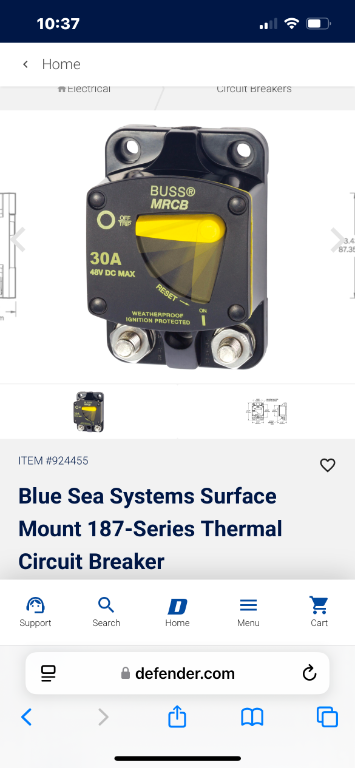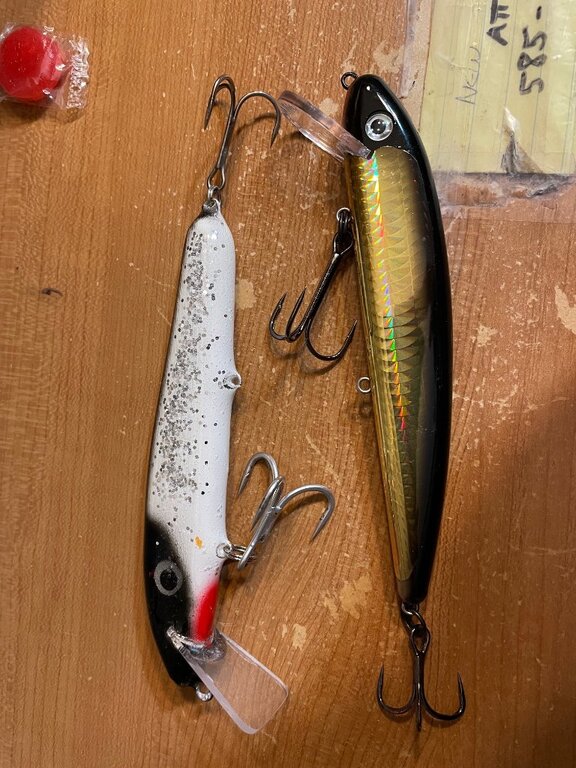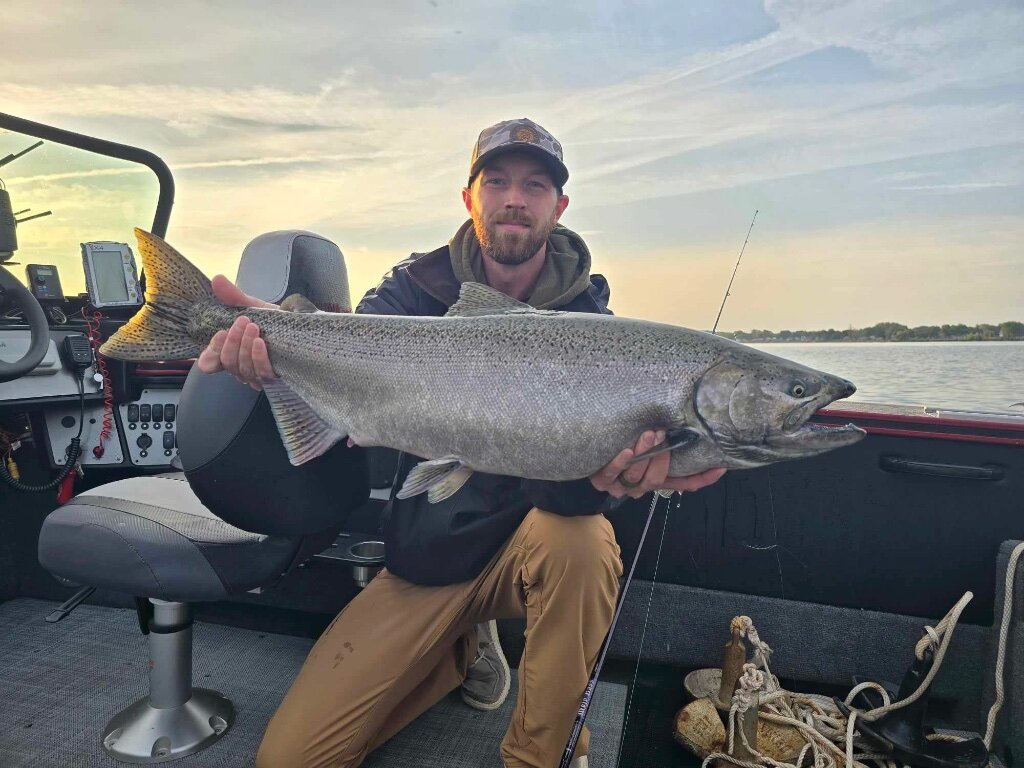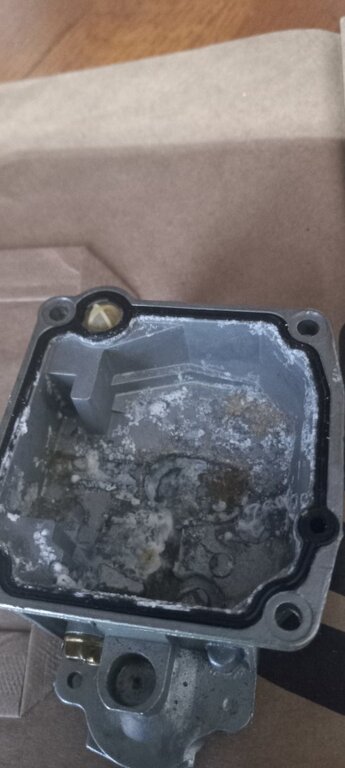-
Posts
1,079 -
Joined
-
Last visited
muskiedreams's Achievements
72
Reputation
-
Sorry if I am giving more detail than you need. My background is in electronics, starting from before chips were in common use and electronics were troubleshot and repaired to the individual transistor, resistor etc. and tubes were still widely in use. Downriggers are high current devices. Since they run on only 12 volts, they draw a considerable amount of current. In order for that current to go from the battery to the downrigger, that entire path must be capable of carrying the current (wire, fuse holder, connectors, connections). Every one of those components can cause resistance to electrical current. That resistance will create a drop in voltage (including resistance of a poor connection). That resistance to current will also create heat in proportion to the amount of resistance. The the higher the resistance, the more the heat that is generated. So checking for heat at all the connections (while operating the rigger fully loaded) might reveal a problem. Whenever the motor in a downrigger encounters a lower voltage due to a voltage drop between the battery and the downrigger, it will demand increased current to maintain RPM. That increased demand for current will cause heat to be generated at the point of the voltage drop. That heat in turn will cause increased resistance which will cause additional loss (snowball effect). Also, low voltage will cause more heat in some of the electronic components on the circuit board which will likely cause premature board failure because of excess current. There should be a minimum voltage requirement listed in the rigger's specs. from Cannon. Dropping below that can cause circuit board failure. In a high current circuit, power is absorbed by all parts of the circuit, including the wire. Wire gauge and connections are much more critical for a 12 volt circuit than for a 120 volt circuit. A skinny wire, a bad connection or too long of a wire are all possible causes of a voltage drop. Therefore, to troubleshoot a problem like this with a downrigger or any other electrical device on a 12 volt vehicle or boat, you must measure the voltage directly between the positive and negative wires at the device 's power input while the device is operating under a normal load. If there is a significant loss, you then must work to measure the voltage along the positive feed, at every connection point between there and the battery and determine where most of the voltage loss is. Do it with the meter negative (-) terminal connected to the battery negative (-) terminal and also measure with it connected to the negative (-) connection at the device. If it is in the wire itself, it will need to be replaced, possibly with a heavier gauge. Don't forget to check voltage at both sides of any terminal on a wire to make sure the loss is not in the connection. If you are running one wire from the battery and then splitting off to two riggers The first wire must be twice as heavy in order to carry enough current to run both riggers simultaneously. It is important for the life of the downrigger that the voltage does not drop too far for too long of a period. A momentary dip in voltage is ok. If the circuit board had it's own separate power feed from the battery, it would not be an issue unless the battery itself was dropping in voltage.Downriggers that don't have a circuit board are not as dependent on battery voltage but it is always best to have steady voltage because the motors will also last longer with a stable supply of power.
-
The point is, a musky and a salmon are not the same. The only thing that is similar is that they are both fish. Salmon are much more plentiful than muskies. A salmon dies after it spawns (most likely unsuccessfully). A musky grows slower and is not ready to spawn until is much older (about 7 to 10 yrs). They will spawn for many years after that and continue to grow larger. Loosing one adult musky from the population is conservatively like loosing 10s of thousands of adult salmon. Salmon are stocked by the millions. in Lake Ontatio alone. NYS stocks only about 25,000 muskies per year statewide. Muskies live maybe about 6 to 8 times longer than a salmon but that doesn't even come close to offsetting the stocking difference. And then when you start talking about survival rate from frye or fingerling to maturity the numbers art even more bleak. Here is a selection of videos from highly experienced musky anglers. All these videos bring up important points and support the methods outlined at the very beginning of this conversation string. Nobody ever mentions anything about using Boga type tools. https://www.youtube.com/watch?v=SzvOComlT_E https://www.youtube.com/watch?v=qxG_iXiqHl4 https://www.youtube.com/watch?v=Kyxn2J2kOMU https://www.youtube.com/watch?v=kBjD7T-s1pI https://www.youtube.com/watch?v=asSQKszobp8 https://www.youtube.com/watch?v=asSQKszobp8
-
Times change, knowledge changes over time and so practices and methods change based on that knowledge and experiences. I am not sure if you are telling me that you believe that the practices of the past were just fine and that changing to current practices made no difference in musky survival. One key thing is that not all dead fish float. Just because a fish goes down when it is released and looks like it is swimming ok, does not mean that it has survived or will survive in the long run. Many fish sink to the bottom when they die. So if a fish dies after being released, it is not sure to float to the surface and be seen dead. And if you don't see it floating on the surface later, that doesn't mean that the fish survived. When you see a fish floating, it is likely that it is dead or dying. So everyone associates a floating fish with being a dead fish. Fish that die and sink to the bottom most often are not seen. So many people believe that all dead fish float. It is simply not true. I can understand trying to revive a trout on some waters where there is evidence of natural reproduction since trout live for multiple generations and may successfully reproduce but not for Kings on the Great Lakes. The practice you suggest just doesn't make sense with muskies. A 15 or 20yo musky is much more precious than a 3yo king salmon. The accepted practice is to keep the fish in a large rubber coated net in the water by the side of the boat while removing/cutting the hooks. The net is used as a live well. Then if you want a picture and/or a board measurement, you should not have to keep the fish out of the water for (generously) more than 30 sec. Then put it back into the net or gently lower and hold the fish in the water by hand. Hold it there and keep it upright in the water until the fish shows it has the power to swim on it's own. It may take up to 20 min. For larger boats it is more difficult if you cannot comfortably hold a fish off the side. That is why many of them use a revival tank as described above.
-
Muskies are not like salmon or trout. This is the reason why this conversation is at the top of the Musky forum. You really don't know if the fish survives. Not all fish that die float. It may just go to the bottom and die after you just performed what might be similar to forced hyperventilation. And physically, it is just as bad as a person being dragged behind a horse. But it is not as big of a deal because they live a short life. Muskies can live 20 to 25 or more years. A musky hasn't even reached spawning age until well after a salmon has died. Also, a musky jaw is less durable than a salmon or trout jaw. Just holding some fish with a boga grip or similar tool, especially a musky, can cause a jaw to be badly ripped (or other injuries) when the fish thrashes. It likely will greatly hamper the survival. Therefore, the use of a boga or similar tool is considered taboo among most musky anglers. The biggest reason kings go belly up is the long fight. Mostly because of the length of line and sometimes also because of the quick rise from deep water. But also, there is usually no effort to keep the fight short. With musky fishing, the heavy rod reel and line, strong lures with strong hooks, and generally only a short amount of line out keeps the fight short and the fish isn't totally winded after it is netted. Salmon anglers don't generally keep the fish in the water for the release process, as most musky anglers do, to help keep the fish from suffocating. I wonder if that when you drag a king that way, it may just sink to the bottom and die anyway. Some may survive, hence an occasional picture with a deformed jaw. But salmon survival after release just isn't as important due to the fact that it is primarily a put and take fishery of a very short lived fish that generally does not spawn successfully. This is the reason why this conversation is at the top of the Musky forum.
-

Very interesting video on the Great Lakes
muskiedreams replied to Andre wallyandre's topic in Open Lake Discussion
It is probably a matter of time till Lake Ontario becomes as badly overrun. by them. But I wonder at what point they will crash for lack of food. I am surprised I was able to watch it since I don't have an acct on FB. They are requiring it even to view a public page of a local company like Wegmans or to a Muskies Inc chapter. Small businesses are being screwed bc not everyone is on FB. They are trying to force it. -

9/18 Casting/Jig Bite
muskiedreams replied to fisherman21's topic in New York Fishing Reports - Lake Ontario (South Shore)
It has to be tough to get to the right depth. Especially in the lake when the current down below is likely different than it is above and you are working more than 30 or 40 ft down. In smaller lakes,bays and in a river it is easier to determine how deep your bait/jig is. When working that deep in the lake, you may also have to deal with wind drift along with top and deep currents which may all be different directions and speeds. Normally in a river your line has a belly which dampens the feel of the bite but in this scenario you could have multiple bellies making it that much more difficult to feel a fish. Self hooking hooks would be helpful. But as far as I know they don't exist. So heavy jigs or maybe an extra weight above (maybe a sliding weight) and using a low diameter line would help. I was typing as 182ccf replied. To you I would like to ask if it is sometimes difficult at those depths in LO to keep the jig within the cone of the fishfinder? Especially with wind direction going cross current. -

How are Waneta Lake weeds this year
muskiedreams replied to muskiedreams's topic in Musky, Tiger Musky & Pike (ESOX)
Those early weeds may have been Curly Leaf Pondweed, which naturally dies off and floats to the surface. But I believe that when they are floating, drop their seeds and they grow the following year. And any weeds that die or are killed with herbicide that fall to the bottom, and the nutrients they were holding return to the bottom and feed the vicious circle of life. So I believe just collecting and removing those weeds will reduce that species of weed over time. So it sounds like there is or was a lot of algae. Killing weeds allows there to be a lot more nutrients mixed into the water that is feeding the algae. Weeds hold nutrients and also reduce the effect that wind has on stirring up nutrients from the bottom which feeds the algae. The excessive algae clouds up the water more, and the combination blocks the sun from reaching the bottom, and weeds need sun. So even if the herbicide didn't kill all the native weeds, they cannot grow without sun. -
I haven't been there this year so I was wondering how the weeds are in the lake this year in light of all the recent herbicide treatments over the past several years. I am mainly concerned about healthy habitat weeds. Weed beds that provide nursery and feeding grounds for sport fish, not a small clumps of weeds here and there. Is there more or less abundance that in previous years? How would you describe the overall makeup of the vegetation in the lake in regard to type, density and distribution? Also, any observations on trends in regard to fishing quality for musky as well as other species, including success rates, size trends, fish health or other fishery quality concerns and observations, especially as related to loss of vegetation over time. There has been very little recent talk about the lake on LOU. I don't know if it is because of closed mouth fisherman who don't want to give up secrets, everyone went to Facebook or some other platform or maybe some other reason(s).
-
I was there just with car last weekend and noticed that in the trailer parking area more than half the parking spots were filled by cars with only one or two empty spots. The town of Irondequoit is supposed to enforce the rules there, including ticketing cars parked in the trailer parking area. But I think they could have designed it with more area for cars to park. It is a waste of space for one car to park in a long trailer space. So I think they need to enforce parking and redesign to provide more car spaces. Another thing that is a PITA there is that cars keep cutting through the launching area behind rigs that are trying to launch.
-

Spinning rod for pike and musky
muskiedreams replied to IV_LUK's topic in Musky, Tiger Musky & Pike (ESOX)
Generally almost, if not all, musky anglers use baitcasters for a number of practical reasons. They don't twist the line like spinning reels do. There are models specifically built to handle heavy pressure and have powerful drag systems needed to keep the fight short so as to not over stress the fish by a long fight. They can hold enough and handle 80 lb to 100 lb test braid and will have less problems with foul casts. Use of a baitcaster with musky lures, as opposed to bass lures, is technically easier because of their weight. Also two piece rods are generally more prone to breakage because of uneven bend due to the two piece connection. There are 9' rods available that telescope from the handle. So you can transport them at about 1.5' shorter. -
-
I have always used 87 octane in my 1990 Grumman with a 1990 75hp Mercury and 1995 15hp 4stroke Evenrude. I bought the boat used in 1996. I trailer the boat and have mostly been in the habit of keeping the tank full when not in use. In winter I add marine stabilizer. I have recently replaced all the small plastic fuel and oil lines inside the 90hp motor. I rebuilt the carbs many years ago but it didn't solve the problem at the time which turned out to be a weak spark issue. I also recently replaced the fuel line between the fuel tank in the bow and the motors BC it was leaking fumes. Since I trailer the boat, every time I use it the fuel in the tank gets mixed up on the way to the launch. So any stratification that may have existed is eliminated before I run the engines. Also, since I don't keep it on the water, there is less opportunity for water to be absorbed from the air since the boat is mostly kept away from the water where there is more humidity during changes in temperature. If the boat is kept on the water with a partially full tank that has vents to avoid pressure changes, every time there is a change in temperature the tank breathes in humid air, the ethanol will absorb it and sink to the bottom. Over time it will build up. Especially over a season with multiple fuel-ups. That is when you really run into trouble. So docking all the time with low fuel level increases the amount of air in the tank and therefore with a large amount of air in the tank each expansion and contraction cycle will draw in a larger amount of moisture into the system. So IMO it is more of a problem for boats that are on the water all season and when the tanks are not kept topped off.
-

Otisco Lake Panfishing question...
muskiedreams replied to bulletbob's topic in Finger Lakes Discussion
All it takes is less than a handful of people harvesting more than they eat for profit, including taking multiple bag limits in a day. Maybe less people should turn a blind eye but without stiff penalties and strong enforcement, perps will see no reason not to do it.








.jpg.f99585f311f95f9f8e7e35500fd5ea33.jpg)
